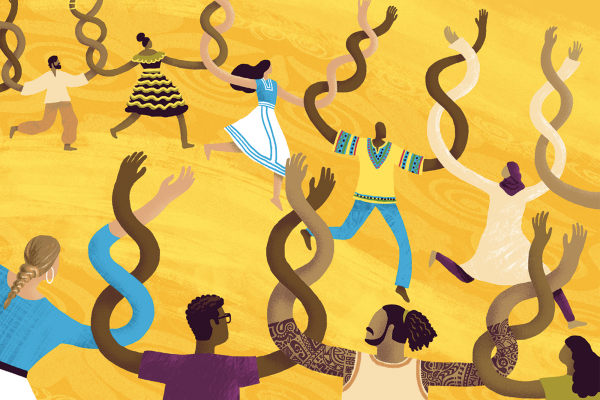EACH OF THESE reflections was written separately, not taking the others into consideration while writing each one. But as I reread them, there is a thread here. It is the thread of what it means to live faithfully together; what it means to do right by one another. Reflecting on love, accountability, economic justice, and what it means to have a righteous mind, I found myself thinking of each text in communal ways, rather than the ways I confess to typically having thought of them: “What do they mean for me, the individual?”
I am more struck by the selfishness I see, in these extraordinary times, when some people flat out refuse to do anything that they believe infringes on their individual rights. I believe that as followers of Jesus we are charged—called—to go beyond ourselves, even if we are socialized differently in our cultures or families. In addition, it is easy to settle into devotions that do not look beyond our own spiritual growth. But in these reflections, I have pushed myself to think about what it means to take in a larger view, to extend personal spiritual growth into the community. In some ways I am trying to reflect the Zulu concept of ubuntu, which indicates that a person is only human in relation to other humans. For me, by necessity, that means we must reach beyond ourselves. I hope these reflections will take you to that kind of humanity which, I believe, will deepen your faith in Christ.
September 6
The Love Debt
Exodus 12:1-14; Psalm 149; Romans 13:8-14; Matthew 18:15-20
“LOVE” IS A landmine word. It has come to mean expressions of sappy, gooey sentimentality. Because of this expectation, requiring the hard “verb” of love as a Christian commitment often gets dismissed. “Owe no one anything, except to love one another, for the one who loves another has fulfilled the law” (Romans 13:8). Every bit of the Romans text requires something more than good feelings. It calls us to examine our Christian debt. To “do no wrong” in a world where wrong stalks so many means we have to figure out how to “right the wrong.” What can it mean to “owe no one anything but love” when this nation robbed Indigenous Peoples of land and livelihood? It would be easy to say, “That was so long ago,” except the effects of that robbery extend into our present time.
It’s easy enough to name the damage, but how do we repair it? What does it mean to say, “Love does no wrong to a neighbor” (verse 10), when our trans siblings are being murdered and dismembered (as in the case of Dominique Fells in Philadelphia)? How do we provide safety? What does “Love your neighbor as yourself” (verse 9) mean in this Black Lives Matter moment of our culture, as we grapple with centuries-old sin against Black humanity? If we in fact owe one another love, then we owe one another justice, which includes repairing the damages done, individually and collectively, in community. It literally means reparation. It means doing so with an urgency, if we in fact believe “salvation is nearer to us now than when we became believers” (verse 11). For some, longing for Christ’s return can be an invitation to ignore the pain of now; but for me, it is the exact opposite. We are called to live honorably, which means to love righteously by “putting Christ on” (verse 14) and being the active love of God in the world by our deeds. Otherwise, it is not love.
September 13
For the Common Good
Exodus 14:19-31; Psalm 114; Romans 14:1-12; Matthew 18:21-35
THE UNITED STATES is an individualistic society, which makes it difficult for us culturally to agree on what constitutes the “common good.” Even laws that govern us are tilted in the direction of individual liberty, rather than seeing the freedom of all. Calls for communal action often are met with suspicion that people are being asked to be “socialist,” a term considered toxic in our political climate. These sensibilities also rule in much of U.S. Christianity. But what would it mean to embrace an ethic in which “we do not live to ourselves, and we do not die to ourselves” (Romans 14:7)? The Romans text is a “nonconflict” document, trying to help believers mitigate against internal struggles about what is the “right” way to be a believer. Believers are told to be careful about passing judgment on one another, but rather to be “fully convinced in their own minds” (verse 5).
Romans 14, addressed to “God’s beloved in Rome,” is not specifically designed to speak to the way we interact as a society. But if the church is a society, a commonwealth unto itself, then I find this text problematic. It devolves into name-calling, and once we begin to label one another as “weak,” then we create an easy path to reduce interaction with people we believe are either beneath us or above us. We become “fully convinced in [our] own minds”—not just about what day to hold as holy or what to eat, but also about whether one believes anti-Black racism is a “real thing” or whether the coronavirus is a hoax. It becomes easy to dismiss data or science because we are convinced of our own beliefs. Perhaps we shouldn’t pass judgment on religious practices, but we also should not use these words to support complacency about societal ills. Christians could repurpose verse 7 to include deep care for one another when it comes to the common good and take the laissez-faire approach to people’s private lives.
September 20
Kin-dom Economy
Exodus 16:2-15; Psalm 105:1-6, 37-45; Philippians 1:21-30; Matthew 20:1-16
I AM A descendant of enslaved people and sharecropping farmers. Agricultural labor is in my recent history, as I grew up on my grandfather’s farm. So, reading Matthew 20:1-16 chafes me. I want to do what interpreters have often done—celebrate the wide grace of God that says, “The last will be first and the first will be last” (verse 16). But I am more with the first laborers who say, “These last worked only one hour, and you have made them equal to us who have borne the burden of the day and the scorching heat” (verse 12). On the sheer matter of equitable wages, they have a point. The abuse of their labor is patently unfair. Yes, they agreed to a certain wage—much like people made poor accept a less-than-living wage because they need a job.
Maybe I am being ungracious to the landowner. Maybe the first laborers jumped at the wage offered them early in the morning because “the usual daily wage” (verse 2) was fair. Maybe they took the work because it was what they could get, much like day laborers standing on corners in U.S. cities wait to be hired.
I presume that setting the text as a parable (“the kingdom of heaven is like a landowner”) is meant to make us overlook these disparities, since we couldn’t possibly hold the “kingdom of heaven” to account. But just because the landowner says “I’m doing you no wrong” doesn’t make it so. Walmart could say the same, while it racked up profits and cut workers. In the middle of a pandemic where “essential workers” are risking their lives so that people who can work from home have what we need, we must read this parable against its intent and hold ourselves accountable. We must do so as citizens of the kin-dom of heaven.
September 27
Our Righteous Minds
Exodus 17:1-7; Psalm 78:1-4, 12-16; Philippians 2:1-13; Matthew 21:23-32
I CAN STILL hear my mother’s voice incredulously asking, “Have you lost your righteous mind!?” She used this phrase when one of her children acted in a way that did not match their upbringing. “You know how to act,” she would say. And that was inevitably followed by reminding us of our family line. That is what I read in Paul’s words to the Philippians: a mentor-leader who wants those for whom he cares to gather their “righteous minds” and make his joy complete (2:2).
What does it mean to have the same mind? For years I assumed “unity” meant that there was never any difference in the way people thought or felt. But years of building alliances and relationships has taught me that unity does not mean uniformity—that we can disagree about how a thing ought to happen, but if we are looking after others’ interests and not just our own, we may well be on the road to “full accord.” Diversity is not division, or necessarily dissent. But community is wholeness when we “empty ourselves,” not in a self-defeating or death-dealing way, but in a way that considers how our lives serve the community’s wholeness.
In a world where selfishness and exploitation can be as common as breathing, Paul’s words—“Let the same mind be in you that was in Christ Jesus”—are compelling, if difficult. We can’t pull them off without realizing that God works in us (verse 13), enabling us to live into shared vision and shared work. We should be careful to humble ourselves, so that we do not yield to a larger vision for the praise we might get from it. If we experience exaltation, it should come from God’s desire. Our Christ-mind will lead us to righteous behavior among and with one another. That alone is a prize.

Got something to say about what you're reading? We value your feedback!






